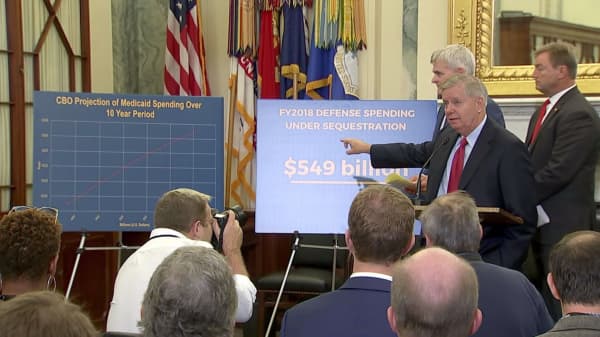The block grants will also allow the states to set up their own risk pools to cover that very small percentage of the U.S. population that account for so much of the nation's health care costs. Remember, the sickest 5 percent of Americans are responsible for more than 50 percent of our annual health-care spending, according to the Agency for Healthcare Research and Quality. The ACA tried to put those most costly patients into the general risk pool and hoped that requiring everyone to sign up for Obamacare plans would defray that cost. It didn't. Risk pools aren't perfect, since nothing short of major medical breakthroughs can put a dent in the costs patients with chronic and serious diseases face. But they do put a much better lid on costs than the Obamacare method that spread those expenses to everyone more directly.
Another welcome part of Graham-Cassidy is its move to end the ill-advised Obamacare Medicaid expansion. The Medicaid expansion made the ACA much more of a new entitlement program and less of a new insurance law. And this expansion has simply not been justified based on economics. Sure, we're not back to the robust GDP levels of the late 1990s. But thanks to the expansion, a whopping 74.5 million Americans are currently on Medicaid according to the latest government reports. That is almost double the 39 million Americans who were on Medicaid just as recently as 2007. Is America twice as poor as it was 10 years ago? Of course not.
And lest you think that expanding Medicaid is the right thing to do despite the macroeconomic numbers, remember that this policy has crowded out the truly poor who already were having some growing difficulties in many parts of the country finding doctors and other health care facilities that accept Medicaid patients. If this new bill allows the states to focus more on the truly poor, it might be worth passing it for that part alone.
Now for the trillion-dollar question: Will this new bill pass?
Remember that the GOP can only afford two defections to set up Vice President Mike Pence to cast a tie-breaking 51-50 vote. Right now, Republican Senator Rand Paul is one of those defectors because he says it keeps too much of Obamacare in place. Maine Senator Susan Collins has not committed one way or another, but her track record of bucking GOP trends and her state's reliance on keeping the Medicaid expansion for as long as possible make her a likely vote against it, too.
That leaves us with Senator John McCain of Arizona, whose vote against the GOP Obamacare effort this summer killed that bill. McCain could be the deciding vote again, and those who believe his previous vote against the Obamacare repeal bill was really about his personal distaste for President Donald Trump are watching closely. That's because Senator Graham and McCain are close friends and even often appear as a tandem in interviews on cable news programs. McCain also said he might "reluctantly" vote for the bill if his state governor endorses it. Arizona Governor Doug Ducey did just that Monday, but McCain is still non-committal. Trying to guess McCain's next move is confounding a lot of the experts again.
That's too bad, because the Graham-Cassidy bill is a significant improvement over what the GOP was kicking around just a couple of months ago. And it's a rare example of a group of politicians actually learning quickly from their mistakes. This isn't just a GOP bill worth Republican votes, it's a measure worth trying for the entire country.
Commentary by Jake Novak, CNBC.com senior columnist. Follow him on Twitter @jakejakeny.
For more insight from CNBC contributors, follow @CNBCopinion on Twitter.






